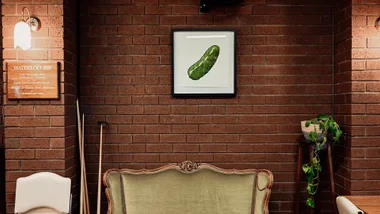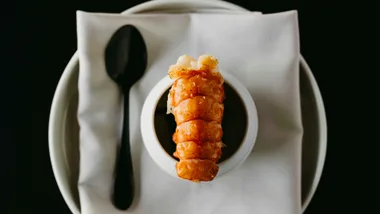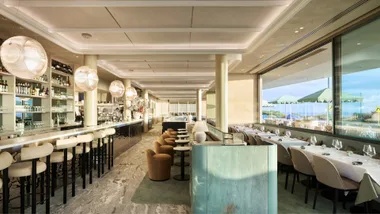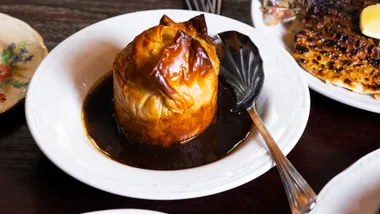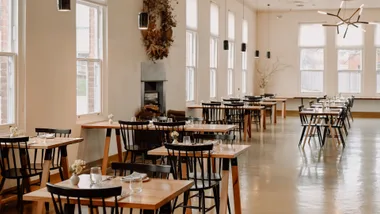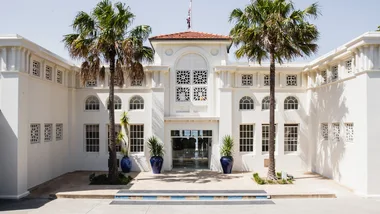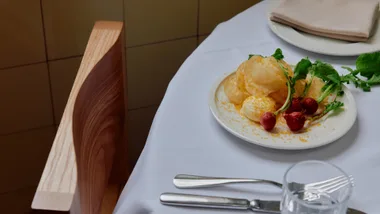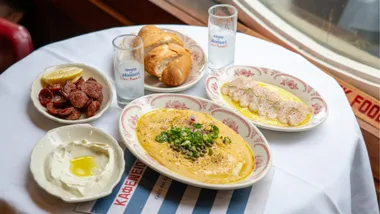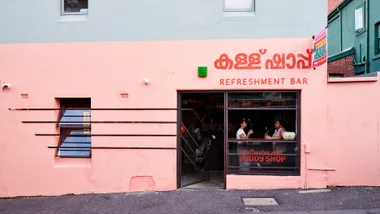Omerta
235 Victoria St, Darlinghurst, NSW, (02) 9360 1011, omerta.com.au.
Cards AE MC V EFT.
Open 5pm-midnight daily (limited menu from 11pm).
Prices Entrées $13-$17; mains $19-$32; desserts $15.
Noise Loud but not deafening.
Vegetarian Three entrées.
Wheelchair access Yes.
Plus Wine bar Italiano.
Minus A few menu glitches.
This restaurant has closed.
Eugenio Maiale isn’t trying to make you an offer you can’t refuse, ask a favour on your daughter’s wedding day, or sleep with the fishes. In fact, he isn’t Sicilian at all, but from Abruzzo, which might explain why his version of omertà (a union of families) differs considerably from the traditional southern Italian interpretation (never go to the authorities for help; keep your mouth shut or we’ll nail it shut for you and fit you for some nice concrete shoes). Admittedly, Maiale’s version seems to have more going for it as a restaurant concept.
If it had been the Maiale family instead of the Corleones in The Godfather, it’d have been a nice big mortadella in the producer’s bed and Luca Brasi would have been sleeping it off after grilled swordfish and some caponata. They might not have cannoli quite worth leaving the gun for, but they’re doing some damned fine food, and not all just your modern Sydney Italian by numbers, either.
If you’ve been living in a cave or on a gluten-free diet, you might not be familiar with Eugenio Maiale. The executive-express briefing is that he’s a bloke from Adelaide who moved to Sydney after heading the kitchens of two successful restaurants in the South Australian capital before taking a chance in the big smoke, working with Robert Marchetti at Icebergs in Bondi Beach and with Stefano Manfredi at Woolloomooloo’s Manta. He opened A Tavola in Darlinghurst in 2007, winning a fast following with pasta handmade with unusual care and judiciously sauced.
Given that Omertà is literally just across the road from A Tavola on the former Provedore Pelagio site, it’s not entirely surprising that there’s no pasta on the new place’s menu at all. Maiale and his partners tried running Pelagio as an upmarket enoteca, but things didn’t pan out, so they decided to join the revolution and reopen it as a wine bar.
Black wooden rods hanging curtain-like in the large front window give the place a bit of a secluded air. The floors and walls are hard, and the bar area down one wall is fronted by a low sandstone wall. There’s a small lounge by the entrance. A long, narrow communal table runs down the centre of the room, à la A Tavola, and tightly packed twos, clothed, candle-lit and ready for romance, line the other wall. The St John-like industrial light fittings over the main table don’t throw an enormous amount of light, and the kitchen glows down the back, framed by hanging bunches of herbs and a tessellated wall of timber blocks.
Mention is made on the menu of the embers of mallee root that are among the kitchen’s arsenal, but it’s not something you notice as a physical presence in the dining room in the way you would at, say, Rockpool Bar & Grill. It provides the fire for the “alla brace”, or charcoal-grilled section, which covers poor old Luca Brasi’s swordfish, as well as the scottadito. The latter is something you see usually translated as “finger-burning”, a reference to grilled lamb chops or cutlets so good that you’ll brook no waiting or cutlery in your rush to eat them. It’s perhaps unfortunate, then, that ours are lukewarm (though perhaps better for our diti). Handsome cutlets, they’re not especially charry or smoky, and sit pooled in oil and covered in salsa verde – something that may be better left to and at the diner’s discretion. Another quite similar dish, a moderately marbled piece of wagyu skirt, grilled, sliced to share and slathered quite thoroughly with a tangy salmoriglio, plays pretty much the same cards but in a more compelling manner.
Omertà is first and foremost about the drinking of wine. Owner/sommelier Glen Davis has six whites on by the glass and around 10 reds. It’s by no means all Italian, either, with riesling made by Egon Müller in the Adelaide Hills rubbing shoulders with Gippsland chardonnay. Wines from Tuscany, Douro, the Rhône, Margaret River and Sardinia pack the red section, along with Omertà From A Farr, probably one the finest house-bottled pinots available by the glass in the country. The bar staff make a decent Negroni, though any barman who responds to a query about white wine by saying he only drinks red and doesn’t solicit help from one of his colleagues needs to rethink his understanding of hospitality. Generally speaking, though, service at Omertà is informed and prompt.
For kicking back at the bar, the warm mortadella sourced from local heroes Quattro Stelle is a treat, and the likes of the crostini topped with treefrog-bright crushed broad beans and almonds and ricotta salata or the puffy brown salt cod fritters with garlic mayo keep the wine and conversation flowing without pause. The cotechino, poached and paired very simply with peas and sweet/hot mustard prunes, is unusually slender in gauge and, for a sausage known for its lip-sticking porkiness, surprisingly mild.
The menu has its duds, of course. The side of mushy snake beans slow-cooked with tomato and oregano is so bland it’s hard to imagine it’s been seasoned. The soft polenta is fine, but so rich in Gorgonzola and walnuts you could serve it as a cheese course. (Mental note: let’s do exactly that next visit, with a glass of Prosecco, perhaps, or a nice Chianti.) The risotto is a dilemma. On the one hand, we must celebrate any restaurant which commits to cooking it to order. But at Omertà, the minimum order is for two people, at around $32 a head, and the serve would quite literally serve four. Adding insult to injury, they won’t, for various reasons, let you take any of it away, which means if there are fewer than four to your table, you stand a good chance of consigning $40 of your $64 risotto to the bin. The other thing is that the dollars and the talk of organic aged fancy rice and cooking to order on the menu may lead you to expect outstanding risotto. What you get is simply good. The version with chunky chestnuts and Jerusalem artichokes has a sweetness that goes unrelieved, while the Milanese, the classic enriched with bone marrow (presented here in rounds atop the rice), has that slightly iodine edge that results from overdoing the saffron. I’d prefer them both to be more on the al dente side, being cooked to order and all, but it must be said they’re commendably creamy. If the idea here was to fill the lacuna created by not having any of Maiale’s excellent pasta, I’d say it still needs work.
For every small whimper, though, the menu has big bangs. I’d like to nominate Omertà’s polpette for meatballs of the month. They’re just lumps of pork and veal in a plain tomato sauce, but they have a lightness that belies their density of flavour. Soft-cooked eggs have become the thinking barfly’s dip of choice, and the version here, in a tiny skillet with turnip tops, tomato and ‘nduja, the spicy red Calabrian pork sausage, is one of the best things they do. Desserts run to strawberries and Marsala in a cocktail glass; thoroughly decent (but perhaps not gun-leaving) peel-leavened cannoli; and Vin Santo with biscuits for dipping. The bomboloni leave them all for dead. They’re served with a chocolate sauce in an espresso cup, but frankly these doughnut-like puffs of cleanly fried, well-flavoured dough need little else. In a dish that so often disappoints, the kitchen has managed to produce a winner.
Omertà. It’s not quite the Italian Bodega or the more booze-infused equal of A Tavola some of us may have hoped for, but it ain’t half bad nonetheless. We might have wanted a Godfather Part II, a sequel that stands side-by-side with its progenitor, enriching it, even, with its presence, but at least we didn’t get the restaurant version of Godfather III.
 Jason Loucas
Jason Loucas
